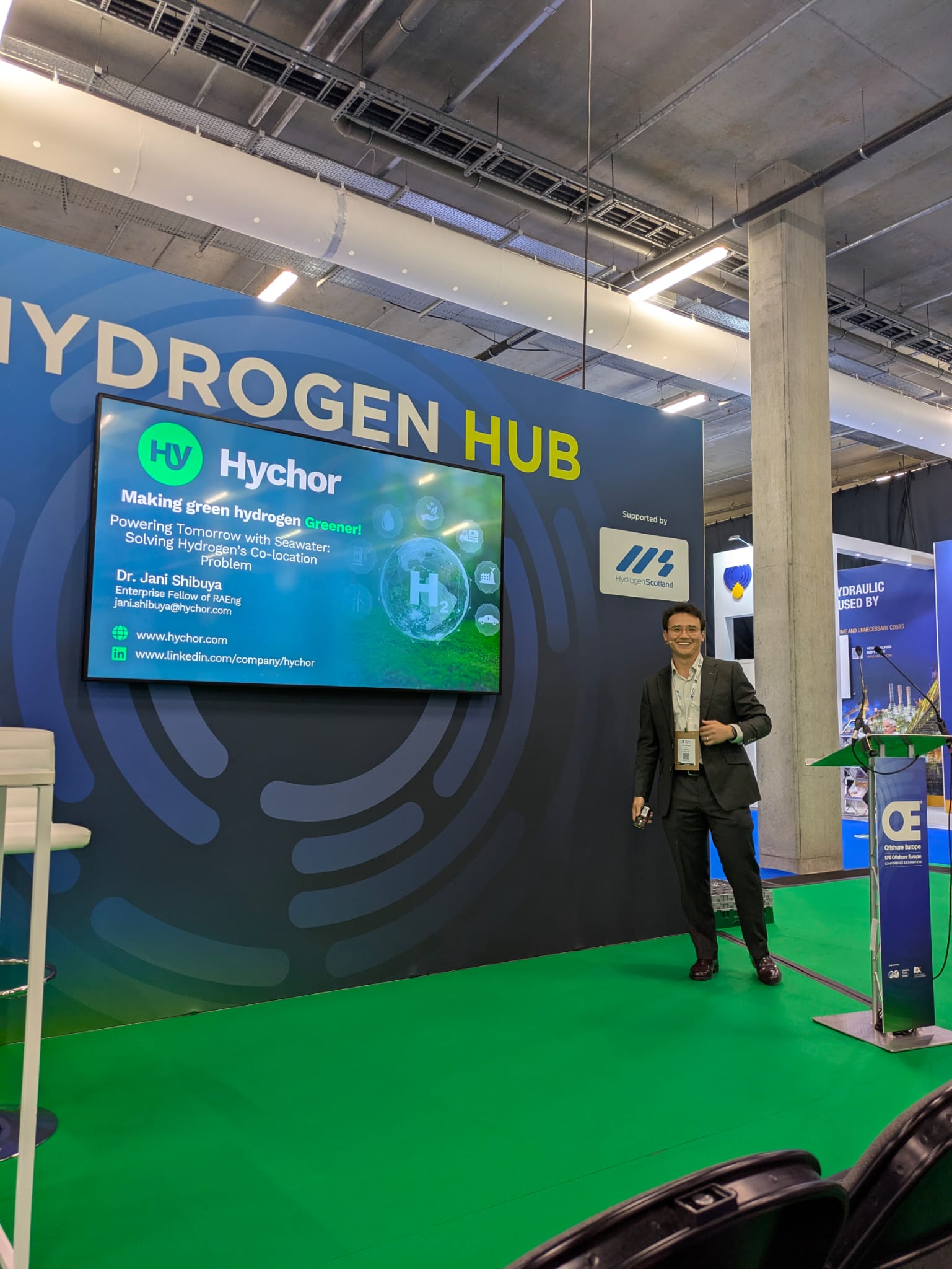ON-SITE, OFF-GRID HYDROGEN PRODUCTION
Powering Tomorrow with Seawater
By harnessing renewable energy and removing grid and infrastructure barriers, Hychor is delivering direct on-demand, low-cost green hydrogen, where and when needed.
About Us
By re-thinking electrolysis, Hychor, a spin-out from the University of Aberdeen, has engineered a novel method of producing hydrogen from seawater instead of freshwater which current technologies rely on.
The Freshwater Problem in Green Hydrogen Production
By 2050, green hydrogen may account for up to 35% of the UK’s energy system. However, producing hydrogen through electrolysis is freshwater intensive, withdrawing up to 32.2 litres of freshwater per kilogram of hydrogen. At scale, this presents a major bottleneck. Seawater is a limitless alternative, but current methods require energy-intensive desalination, which drives up costs and imposes complex infrastructure requirements.
Download our free guide: ‘Hydrogen: The Fuel of Tomorrow?’ to learn more about the science and potential of hydrogen as a fuel.
Globally, by 2050, green hydrogen production could withdraw over 11.5 gigatons (GT) of freshwater—more than three times the UK's annual domestic water use.
Speak to our team
The Freshwater Problem in Green Hydrogen Production
By 2050, green hydrogen may account for up to 35% of the UK’s energy system. However, producing hydrogen through electrolysis is freshwater intensive, withdrawing up to 32.2 litres of freshwater per kilogram of hydrogen. At scale, this presents a major bottleneck. Seawater is a limitless alternative, but current methods require energy-intensive desalination, which drives up costs and produces polluting brine.
Download our free guide: ‘Hydrogen: The Fuel of Tomorrow?’ to learn more about the science and potential of hydrogen as a fuel.
Globally, by 2050, green hydrogen production could withdraw over 11.5 gigatons (GT) of freshwater—more than three times the UK's annual domestic water use.
Speak to our team

Hychor’s solution
Hydrogen Seawater Electrolysis Technology (HySET)
Hychor’s technology eliminates the need for desalination, reducing both capital and operational costs. Unlike traditional methods, our electrolysers can return seawater to the ocean without removing salts or introducting additives, avoiding the generation of corrosive by-products.
By integrating our unique seawater flow battery, we can rapidly deploy our solution on-site for the consumer, minimising large infrastructural barriers: freshwater, grid connections, and national hydrogen pipelines.
Why Choose Hychor
Cost-Effective, Sustainable, Scalable
Eliminate Desalination and Reduce Costs
Hychor removes the need for desalination, reducing both operational and capital costs. This solution scales to meet the needs of large energy providers and industries, while supporting a sustainable future by not tapping into freshwater resources.
Maximise Renewable Energy Efficiency
When combined with renewable energy, such as wind, excess electricity can be converted into green hydrogen—avoiding costly grid constraint payments and ensuring energy isn’t wasted.
On-site, Off-grid
Our technology is specially designed to intake direct fluctuating inputs of renewable energy but sustain a costant output, making it perfect for off-grid deployment with minimal infrastructure.
Hydrogen where and when you need it.
Our Solutions for Key Industries
Markets
Hydrogen Producers
Hydrogen producers, energy companies, and plant managers responsible for large-scale hydrogen production processes. These organisations are focused on reducing operational costs, improving efficiency, and scaling sustainable hydrogen production.
Who: Large-scale energy providers, electricity companies, and gas producers.
Eliminate desalination, reduce costs, and simplify hydrogen plant operations with scalable seawater electrolysis.
Hydrogen Consumers
Industries and businesses that consume hydrogen directly for operations, including maritime, steel, ammonia, and small-scale users. These sectors benefit from on-site hydrogen production using seawater, reducing logistics, freshwater dependency, and improving sustainability.
Who: Maritime (ports and ships), industrial manufacturing (steel, ammonia), small-scale hydrogen consumers.
On-site hydrogen production that reduces logistics, cuts costs, and avoids reliance on freshwater.
Meet the Innovators Behind Hychor
Speak to Our Team
You can schedule a call with our founder, Jani, to learn more about our project and discuss how we can support the green hydrogen economy.
“Cheap, accessible energy is key for global prosperity, creating it sustainably ensures it stays that way”
Stay Updated
Get in Touch with Hychor
Interested in learning how our seawater electrolysis technology can transform your hydrogen production? Whether you’re part of a large-scale energy provider, a plant manager, or from an industry seeking on-site hydrogen solutions, we’d love to hear from you.






